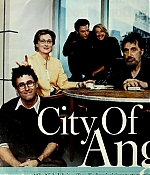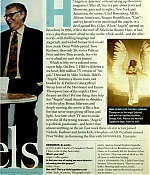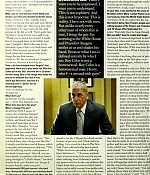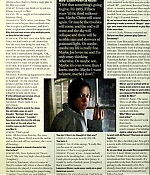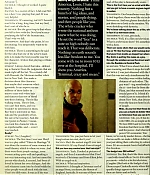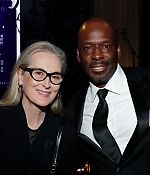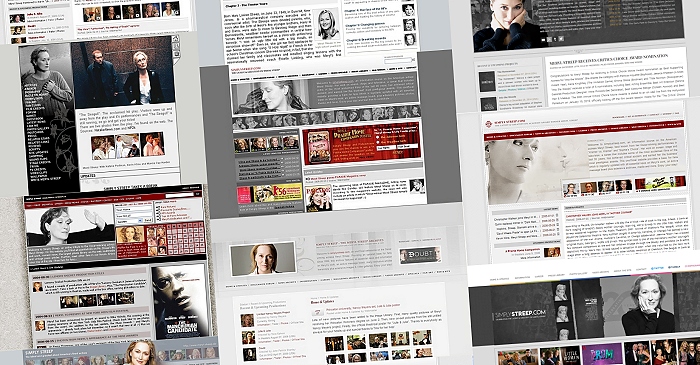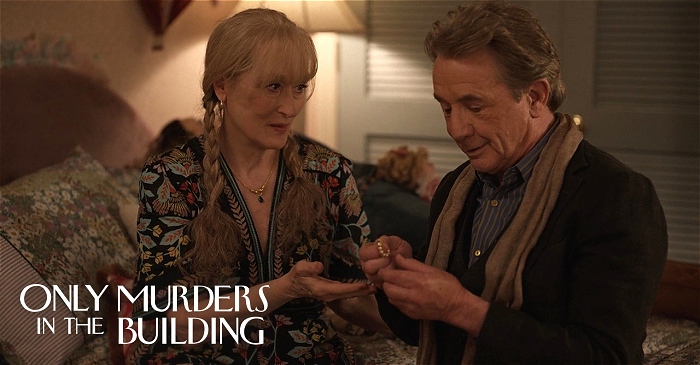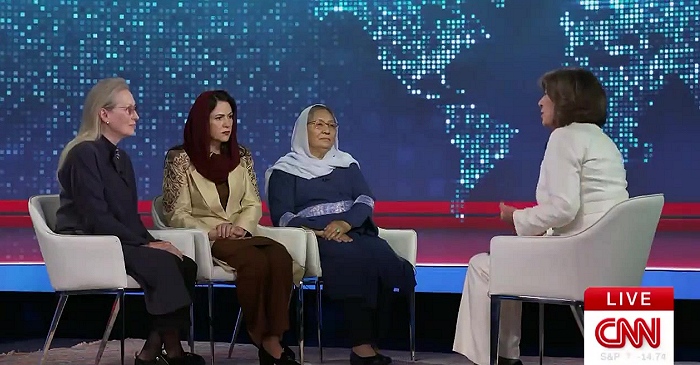
|
City of Angels
Newsweek ·
November 06, 2003
· Written by David Ansen
|
How in heaven’s name do you describe “Angels in America” without taking up this entire magazine? After all, this is a play about Jews and Mormons, gays and straights, New York and Antarctica, the ozone, Ethel Rosenberg, AIDS, African-Americans, Reagan Republicans, “Cats”-and we haven’t even mentioned the angels, or a devil named Roy Cohn. When “Angels” opened on Broadway in 1993, it blew the roof off American theater. Here, at last, was a play that wasn’t afraid to take on the whole world-and the afterworld-with thrilling language and stagecraft, and wicked humor that would have made Oscar Wilde proud. Tony Kushner, then only 36, won a Pulitzer Prize and two Tony awards. See why we’re afraid we can’t do it justice? Which is why we’ve enlisted some expert help. On Dec. 7, HBO will debut a six-hour, $60 million TV version of “Angels.” Directed by Mike Nichols, HBO’s “Angels” features a dream-team cast headed by Al Pacino (Cohn), Meryl Streep (one of the Mormons) and Emma Thompson (one of the angels). How dreamy are they? For one thing, they help this “Angels” stand shoulder to shoulder with the play. Brutal, hilarious and deeply moving, the movie is like a bonfire that never stops giving off heat and light. At a time when TV movies make news for all the wrong reasons, “Angels” is political, passionate-and better than almost anything on the air. Last week these all-star actors joined Nichols, Kushner and Justin Kirk, who plays an AIDS patient named Prior Walter, in discussing the film with NEWSWEEK. Excerpts:
NEWSWEEK: So Justin …
Justin Kirk: I knew it! [Laughter] Clearly I have a role to play here today.
What’s your role?
Kirk: Coffee-getter.
Is that your way of saying you were intimidated coming into this project?
Kirk: Nope.
Not a bit? This is a fairly legendary cast.
Kirk: Yeah, of course. The people in this room, you know, are certainly of note. But I think the biggest burden was the play, because it wasn’t just a great script. It was a previously hugely celebrated separate entity. And my friend Stephen Spinella played the role on Broadway to great acclaim, so I certainly felt the burden of that.
Al Pacino: That was sort of all of us. We all came in with that feeling.
Emma Thompson: No, I didn’t have that because I’d never seen it. That was sort of both a blessing and a curse, really.
Kirk: Emma was on the receiving end of our neuroses.
Thompson: A great privilege it was, too.
What kind of neuroses are you talking about?
Kirk: You know, deadening self-doubt and fear.
Meryl Streep: Oh, I had that. I had that, too. [Laughter]
Pacino: That comes and goes.
Kirk: I don’t believe you. You pretended to have it one day, and I thought you were just doing it to calm me.
Streep: I was. [Laughs]
Mike, you’ve said that you wrote down your dream cast when you decided to do this movie.
Mike Nichols: This certainly was it. There was no one that any part was offered to that we didn’t get. That was a nice start.
Thompson: It’s nice not to be the 35th person on the list as well. That’s quite rare.
Nichols: As an actress once said to me, “Thank you so much for my part. Usually five or six people have to die before I get cast.” [Laughter] But in this case it was obviously a piece that everybody knew and loved. They’re great, great parts. And I think actors also sometimes like to do things for too little money.
Streep: Oh? Do you think so? [Laughter]
Nichols: Because it feels like art.
Tony, a lot has changed since “Angels” first appeared. Here was a play about the ’80s that came out in the ’90s, and now we’re 10 years further along. One of the things that made the play of its moment was that it was about gay liberation, and now it’s showing next to “Queer Eye on the Straight Guy.”
Tony Kushner: For the straight guy …
What did I say?
Kushner: On the straight guy … Well, that happens, too.
What does that do to the play? What’s changed for you?
Kushner: Well, I mean, of course, the world has changed enormously since the play was written, and thank God. But I was scared about that in terms of the film. I thought, “Is it just going to be very old hat?” But the way Mike has made it, it doesn’t insist that you go back into the period by shoving it at you. “This was back then, when things were like this.” It simply uses the basic tool of drama, which is empathy and compassion, and says, “This kind of suffering was the consequence of this kind of oppression.” After all, you can immediately sympathize with what Nora is going through in “A Doll’s House.” You don’t need to be in a pre-feminist era. You get it because the play makes you get it.
And obviously CBS just learned-the hard way-that people still care passionately about the Reagan era. How do you feel about the flap over the mini-series?
Kushner: I don’t know, because we don’t really know what happened. But it does sound to me like CBS put the kibosh on this because of pressure, and I think that’s appalling. I was struck by a line in The New York Times editorial today that warned, “While the former president is suffering from Alzheimer’s …” Of course, anybody who’s a human being feels sorry for anyone who’s suffering from Alzheimer’s, and for any spouse who has to take care of them. But I don’t think that a president of the United States can be safely exempt from public criticism, in art as well as in other forms, because of present-day debility. I wish his suffering were eased, and I don’t have any desire to see her suffer. But they ran the country for eight years, and, in my opinion, did great damage.
Do you think CBS’s decision will have a chilling effect on political art?Kushner: I think it’s going to boost the ratings for the thing through the roof when it turns up on Showtime.
Thompson: Yeah, I can’t wait to see it.
In your film, I was startled at the scene in Brooklyn where Mary-Louise Parker is on the roof and you show the World Trade Center.
Nichols: Well, it’s correct for the era.
But kind of gutsy. Don’t forget, people were editing images of the Towers out of movies and TV shows after September 11.
Kirk: That didn’t last for long, though.
But you didn’t have to create that image.
Nichols: It seemed important to me that it was there then and it’s not there now. And that’s part of the way in which we’re looking at this film. What was there then, what’s not there now. What is there now that wasn’t.
Kushner: One thing that sort of produced the play in the first place was a feeling of Apocalypse, which is now very much with us.
Streep: I wanted to ask you, Mike: what made you think this could work? I thought the play was amazing and in its time and place it just sort of radiated heat. But it was a theatrical experience I thought could never, ever be achieved in any other medium. It’s such an act of bravery and of recklessness-sort of a young man’s challenge, you know. Not that you’re not young in every sense, in your mind and in your outlook, but I’m in awe of that starting place that says, “Yes, I think I can do that.”
Nichols: It’s not entirely different from how you feel reading a play or film script for a part. There are instinctive responses. Something in you begins to stir when you read certain portions of things. And then there’s the experience I think we all had that brought us so wonderfully together and became the tone of every day’s work, which was: “There’s too much to understand.” You could never, I could never, understand all six-and-a-half hours, you know, in time to shoot it. I mean, I’m not that kind of scholar. And we’re still arguing what the play is about. On the way to the premiere last night, my wife [Diane Sawyer] said, “You keep talking about what it’s about, but only I know what it’s about.” I said, “OK, if you’re so smart, what is it about?” She said, “Being Jewish.”
Kushner: Seeing it last night, I realized it’s completely a film. The language is not in any way naturalistic-it’s very large; it’s written for the stage. But it’s so completely effortless how that trip from a stage play to the film was made.
Streep: It makes me think we’re not ambitious enough on film.
Pacino: We’re caught in that naturalistic language thing.
Thompson: We’re actors, you know. The point is not to be just like everybody else. One is to give a performance, and that’s what’s so glorious about this opportunity.
Why did you have actors play multiple parts, as they did on the stage?
Kushner: The first time that Mike and I met, we had lunch to talk about this. And the very first thing he said was, “I want to do the doubling.” It never occurred to me that anybody would do that. And I immediately thought, “OK, this is the person that should make this.” It’s celebrating the artificiality of the event, and it’s scary for people in film to do that. You know it’s Emma again, in another role. You know it’s Meryl as another person.
Nichols: Something happened in America quite a while ago-far less in England-it’s the idea that acting is feeling, which is such nonsense and so useless and leads us into a corner of unintelligible people muttering.
It’s the ultimate perversion of Lee Strasberg and the Method.
Nichols: That’s right. It is a perversion.
When I started to watch the show, the old rabbi came on and I thought, “Onstage this part was played by a woman.” I couldn’t figure out who this terrific old guy was. Only at the end when the credits came on did I realize it was Meryl
Streep: That’s good.
Kirk: All the extras that day, the same thing. They knew Meryl was in the movie, and as she took off her costume, they were all buzzing.
Have you played a Jewish character like that before?
Streep: Oh, Nora Ephron [in “Heartburn”]. She was very high-church Jewish. [Laughter]
Nichols: You know, when it comes to Meryl’s curtain call, where it shows all the characters she played, I wanted to throw in the black woman singing the gospel song. [Laughter] And then say, just kidding.
Emma, was it intimidating to do all those characters in front of the queen of accents?
Streep: [Sighs]
You don’t like to be thought of that way?
Streep: [Even more wearily] It’s OK.
You hate it.
Streep: Yes. It’s like saying, “I really like you because of your feet.”
Nichols: That’s a very good simile.
Streep: It’s just, it’s so-I mean nobody means to be insulting but … it is. I mean, if I only played people from New Jersey, it would be such a limited career. [Laughter] But it would be honest.
Laurence Olivier could never really do a good American accent.
Nichols: Or a Jewish accent, God help us.
That whole generation of English actors couldn’t do American. But they didn’t grow up with television.
Thompson: That’s exactly it. My mom and dad both went to theater school, always expecting to do Shakespeare. They were required to do three accents at drama school. RP-you know, Received Pronunciation-a country accent and then maybe Irish or Scottish. You know, that’s all you needed. Now you practically have to know the f-ing U.S. postal district.
Al, we’ve heard that when Robert Altman was planning to make a movie of “Angels” years ago, your name was mentioned to play Roy Cohn even then.
Pacino: Yeah, Altman contacted me.
Did you see Ron Leibman play Cohn on Broadway?
Pacino: I saw Ron and I saw F. Murray Abraham. I remember the effect they had on me, but fortunately I saw it a long enough time ago. There’s something about seeing someone do something that you’re going to play that gives it-it’s almost a model. I did “American Buffalo” that way. I did “Pavlo Hummel” that way. It’s almost like, “Somebody did it, so therefore it can be done.” It sanctions it for you. And even though you don’t copy the model of it, it gives you a kind of confidence that at least it can be done and done really well, so you’ve got something to go for.
Meryl, you’ve worked with so many great actors in your career. What was it like to work with Al as compared to Dustin Hoffman or Bob De Niro?
Streep: Same. The same. They’re all alike. [Laughter] It was great. We’ve known each other for 30 years and I’d never worked with him.
Why? Were you avoiding each other?
Pacino: She doesn’t work that much.
Streep: His leading ladies are much younger. I’m kidding.
Justin, what was it like not to work with Al Pacino? You have no scenes together.
Kirk: It’s like a horrible joke. You get to do a movie with Al Pacino and never work with him.
Al, do you think you made Roy sympathetic?
Pacino: I don’t think you set out to do that. I think it’s innate in the characterization that Tony has made. It’s impossible to do that character without getting to the humanity of it. He’s already done that work, and so it’s up to you to sort of find it in yourself and follow his lead.
Thompson: You know, what he made me think of when I first read the play was Satan in Milton’s “Paradise Lost.” That’s who he is. And you’re so fascinated by Satan, he’s the best character.
Pacino: I played him once [in “The Devil’s Advocate”].
Nichols: I thought it worked. I quite liked it.
Pacino: As a matter of fact, I did read Milton when I was playing that part. It was very helpful.
Thompson: It’s amazing, isn’t it? I haven’t read it for a long, long time, but my God, that’s sort of who he is.
Kushner: But the great trap is that when you fall in love with the Devil you’re recapitulating the fall of the human race. That’s why we fall.
Thompson: And that’s the point. It’s so fascinating. You desperately want to be with him.
Nichols: There is something to be said for the idea that one of the actor’s main jobs is to make the best possible case for the character. Al does that playing a villainous person.
Streep: I always loved that idea-defending a character from the judgments that are made right off the bat. We certainly did with Hannah, the Mormon mother who’s lost in New York. You make a decision about this character that maybe she’s someone who’s ignorable. In an airport you see millions of these ladies in mauve coats with white hair and features that sort of blend into their clothing. They’re like walking errata. They’re lost, you can’t find them, and you wouldn’t be interested in them. But Tony’s interested in Hannah and the possibility of her, the size of her journey. And this one [points to Pacino]. I mean, you took this character who is so reprehensible, and… even I was touched.
Really?
Streep: No. [Laughter]
Nichols: The first time I ever saw Meryl was in a play called “Taken in Marriage.” It was about the reunion of some women in a small theater, which is where we were. And there were these people onstage, some women acting quite well and speaking a not-very-interesting text. And out came this person who clearly, it seemed, had been allowed to invent her own dialogue. And she said whatever came into her head while the other people were all stuck with the text. That’s the difference. It was as if she was improvising. The accents are great, but as you say, they’re beautiful feet.
Emma, how do you play an angel? There’s not a lot of precedent.
Thompson: No, you just have to let your imagination run riot, don’t you?
Pacino: She’s the sexiest angel I ever saw.
Thompson: It’s my Farrah Fawcett angel.
Did you have any control over that hairstyle?
Thompson: Yeah. I looked at pictures of angels, and then I remembered that I had received a Christmas card from Elton John. With an angel on it.
Nichols: What an inspiration.
Thompson: I thought a Christmas card of an angel from, you know, the Queen of England, basically. It was one of those wonderful little Renaissance angels with wispy hair. And Mike, you wanted a proper angel.
This is a very sexual angel. You get to seduce both Justin and Meryl.
Thompson: The sex! It was just such a wonderful thing to play. It’s a kind of sexuality that’s like fire. Because I think that part of the play is fantastically erotic.
This is the first time you’ve acted with Meryl and you get to have a cosmic orgasm together. In midair.
Thompson: Our breastbones were literally tied together; there were like six inches between us. And our glasses knocked as we put them on to look at the monitor. We were shrieking with hysteria.
We’ve been talking about this as a film, when in fact it’s a television show.
Thompson: It’s not, precisely.
Nichols: Well, it’s a film on television. What is a television show? It’s something with a host.
There are some shots that you would rarely see on TV, like that long, wild tracking shot that goes from inside an elegant bar where Roy Cohn is putting the make on a guy, through the window across the street and then into the Rambles in Central Park.
Kushner: What I love about that shot is it goes zooming and then it stops for traffic.
Nichols: I was just obsessed with the fact that this was not only simultaneous but that they were within hailing distance of each other. The guy was f-ing somebody in the a- not that far from the Plaza, and that seemed to me a crucial part of it. I think it’s worth it just to remember that about New York, that 20 yards from the fanciest hotel is a kind of jungle.
Mike, do you feel that these days you can actually do bolder things on television than you can in film?
Nichols: I do, yes. It has to do with HBO, it’s as simple as that. We love HBO and we love the freedom that there is on HBO, and the power. And what is that power? It’s economic. You know, we’re run by market forces-the fact that an outfit can make a billion dollars a year just sitting there collecting its subscriptions. It’s an economic basis that affords us this freedom.
The budget was $60 million?
Nichols: Yes. But, that’s like three movies-and with visual effects! So it’s $20 million per movie-which is a lot for television. [Laughter] But look at the budget of any Disneyesque Cinderella movie where little sparkly things appear on the screen and there are fairies and so forth.
Thompson: You see a lot of these movies?
Nichols: Well, I have a granddaughter.
Kushner: Sparkly things and fairies. It’s sort of a good description of our movie.

